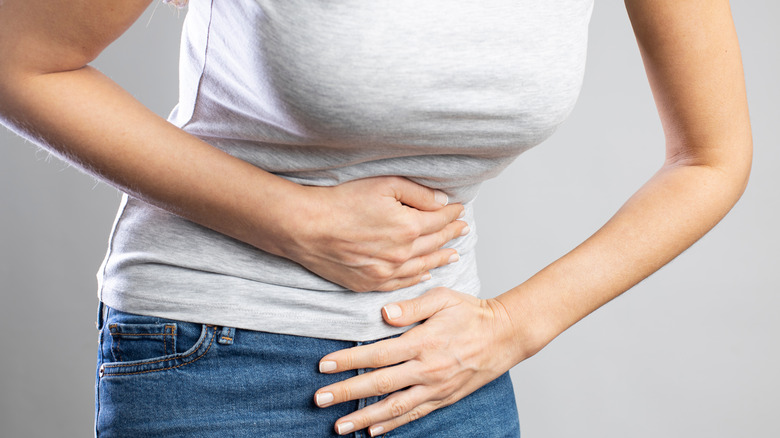How To Treat And Prevent Trapped Gas
Intestinal gases are an important part of the human digestive process and usually comprise methane, oxygen, and hydrogen, among others (via Cleveland Clinic). While sometimes passing gas is odorless, other times bad gas may have a sulfur smell. That's because of the mixing of gases with intestinal bacteria, explains Cleveland Clinic. The process of passing gases is painless. However, at times, these gases could become trapped in the gut.
According to Medical News Today, trapped gas is a painful condition that leads to immense abdominal pain. This usually happens when the gases cannot find a way to release and are unable to pass through the body. Trapped gas could occur for many reasons, but Medical News Today highlights that it usually happens when you eat foods that trigger flatulence or have internal gastrointestinal issues. Per Healthline, trapped gas causes stabbing pain in the abdominal region. At times, people might mistake this pain as a sign of a heart attack or appendix problem.
How can you prevent or ease pain from trapped gas
One of the best ways to prevent trapped gas is by going for a walk regularly or doing any physical activity, explains Medical News Today. Some kind of daily exercise or workout routine can aid proper digestion and prevent gases from causing pain. Moreover, Medical News Today experts suggest quitting smoking. A 2016 study published in the Scandinavian Journal of Gastroenterology discovered that smoking was linked to stomach aches, bloating, and even constipation.
If you have persistent trapped gas, you should also avoid carbonated drinks like sodas or energy drinks. Instead, drink warm fluids such as tea (via Healthline). Experts suggest drinking herbal teas reduces bloating and improve digestive processes including peppermint, chamomile, or ginger teas. Another quick way to get rid of trapped gas is by mixing apple cider vinegar in a glass of water. Although there's no scientific evidence to back up its benefits, apple cider vinegar poses no harm to your body and in fact, can be a useful dietary aid, explains Healthline. Finally, you can always go for the therapeutic effects of a heating pad, recommends Medical News Today. The warmth from a heating pad relaxes abdominal muscles and allows the gas to pass easily.


